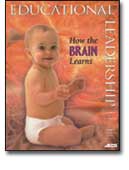Georgia Governor Zell Miller garnered national attention last January when he extolled classical music as the neuroscientific birthright of Peach State babies (see Weinberger, pp. 36–40). But overall, elected officials are just beginning to respond to public awareness of emerging brain research. Recent findings about early brain development have far-reaching implications for the care and education of our youngest children (see Wolfe and Brandt, pp. 8–13), and some children's advocates are now demanding that policymakers pay attention.
Using Our Heads About Head Start
At the federal level, one small but hopeful sign that policymakers are paying attention to neuroscientific research is the expansion of funding for Early Head Start, which serves children under age 3. Funding is increasing from $7 million to $10 million—albeit still a small sum. Legislators on both sides of the aisle have come head-to-head with some difficult decisions over the reauthorization of the entire Head Start package. A key issue is whether to use limited federal dollars to improve existing Head Start efforts for 3- to 5-year-olds or to expand Head Start early childhood education programs to meet the needs of thousands of unserved children. In a nation where one in five children under age 5 still lives in poverty, and only 40 percent of eligible children benefit from Head Start, such a decision has tremendous import.
Many advocates have hailed the Head Start legislation's emphasis on the professional development of early childhood educators, including requirments that early care providers hold at minimum an associate's degree. And yet many have also voiced concern about the developmental appropriateness of new proposals to establish achievement standards for children in Head Start programs.
Taking Notice of Neuroscience
- Kansas, which initiated the first federal-state partnership for Early Head Start by designating $5 million in grants in August to bolster this program that serves children under age 3;
- California, where voters will consider a November 3 ballot initiative spearheaded by actor and activist Rob Reiner to increase funding for programs to support the development of children under age 3; and
- Iowa, where legislators enacted a program that offers block grants to communities to fund education efforts for children under age 5.
Emerging research on early brain development has failed to spur large-scale policy initiatives, but these state and federal efforts do indicate a hopeful trend. The challenge remains for educators to use brain research as they continue to advocate for more extensive programs for our youngest learners.
